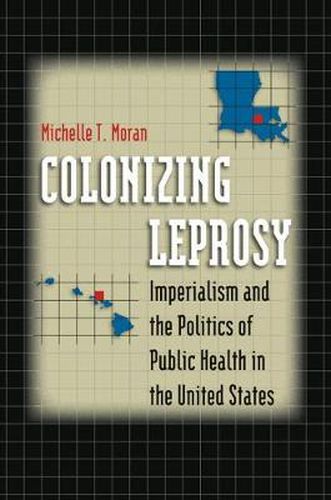Readings Newsletter
Become a Readings Member to make your shopping experience even easier.
Sign in or sign up for free!
You’re not far away from qualifying for FREE standard shipping within Australia
You’ve qualified for FREE standard shipping within Australia
The cart is loading…






By comparing institutions in Hawai'i and Louisiana designed to incarcerate individuals with a highly stigmatized disease,
Colonizing Leprosy
provides an innovative study of the complex relationship between U.S. imperialism and public health policy in the late nineteenth and early twentieth centuries. Focusing on the Kalaupapa Settlement in Moloka'i and the U.S. National Leprosarium in Carville, Michelle Moran shows not only how public health policy emerged as a tool of empire in America’s colonies, but also how imperial ideologies and racial attitudes shaped practices at home. Although medical personnel at both sites considered leprosy a colonial disease requiring strict isolation, Moran demonstrates that they adapted regulations developed at one site for use at the other by changing rules to conform to ideas of how
natives
and
Americans
should be treated. By analyzing administrators’ decisions, physicians’ treatments, and patients’ protests, Moran examines the roles that gender, race, ethnicity, and sexuality played in shaping both public opinion and health policy.
Colonizing Leprosy
makes an important contribution to an understanding of how imperial imperatives, public health practices, and patient activism informed debates over the constitution and health of American bodies.
$9.00 standard shipping within Australia
FREE standard shipping within Australia for orders over $100.00
Express & International shipping calculated at checkout
By comparing institutions in Hawai'i and Louisiana designed to incarcerate individuals with a highly stigmatized disease,
Colonizing Leprosy
provides an innovative study of the complex relationship between U.S. imperialism and public health policy in the late nineteenth and early twentieth centuries. Focusing on the Kalaupapa Settlement in Moloka'i and the U.S. National Leprosarium in Carville, Michelle Moran shows not only how public health policy emerged as a tool of empire in America’s colonies, but also how imperial ideologies and racial attitudes shaped practices at home. Although medical personnel at both sites considered leprosy a colonial disease requiring strict isolation, Moran demonstrates that they adapted regulations developed at one site for use at the other by changing rules to conform to ideas of how
natives
and
Americans
should be treated. By analyzing administrators’ decisions, physicians’ treatments, and patients’ protests, Moran examines the roles that gender, race, ethnicity, and sexuality played in shaping both public opinion and health policy.
Colonizing Leprosy
makes an important contribution to an understanding of how imperial imperatives, public health practices, and patient activism informed debates over the constitution and health of American bodies.